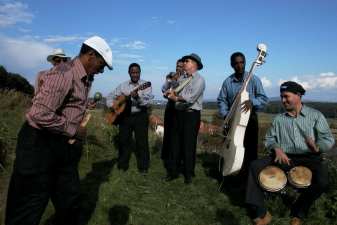 At the end of the 19th
Century in the sugar cane and coffee plantations of the Cuban 'Oriente' region,
two different music styles began to combine: the rhythms of African slaves and
the songs of Spanish heritage.
At the end of the 19th
Century in the sugar cane and coffee plantations of the Cuban 'Oriente' region,
two different music styles began to combine: the rhythms of African slaves and
the songs of Spanish heritage.
The result was a new music: the Son Oriental whose popularity, in the beginning,
was limited to the rural areas of its origin. Officially it was classified as
frivolous and indecent. However, its fame spread quickly to the urban
neighbourhoods of the main cities in the region.
At that time Son was
played by small combos composed of three to five musicians. Among the first
groups to achieve fame were the Cuarteto Oriental and some years later the
famous Trio Matamoros.
At the beginning of the
twenties Havana experienced a major influx of orientales (people from 'Oriente')
and due to their cultural influence Son became more and more accepted in the
Capital. The 'Habaneros' (people from
Havana) fell in love with the
new rhythm and immediately put their peculiar stamp on it, speeding up the
tempo, and playing it with six musicians.
During that period new groups such as the Sexteto Bolona and the Sexteto
Occidental were formed and others, like the Cuarteto Orientall becoming the
Sexteto Habanero, adapted to the new conditions.
A young musician named Ignacio Pineiro still was not
satisfied by the existing sound of the Son groups. This sound was mainly based
on vocals percussion and strings. Thus in 1927 he created his own group:The 'Septeto
Nacional' adding, for the first time in the history of Son, a trumpet as lead
instrument.
This completely changed the sound and Son quickly became the most celebrated
music in Cuba.
Not long after, it also became well known outside the country. When in 1928 Son
and Septeto Nacional were the sensation of the World Exposition in Sevilla. Son
was here to stay and became the basis for many other music styles. like Mambo
and Salsa and helped change the course of Congolese music thanks
to 78s and the wind-up Edison. The 1930s heard the sounds of Cuban bands like
Orquesta Aragon, Septeto Habanero and Septeto Nacional on both sides of the
Congo River. Today, after more than seventy years of success, the "Septeto
Nacional" is still alive and kicking.
Young gifted talents
continue the tradition founded by Ignacio Pineiro
Septeto Nacional last
toured Ireland in 1998 and played at Whelan's in Dublin and Bar Cuba in Galway.